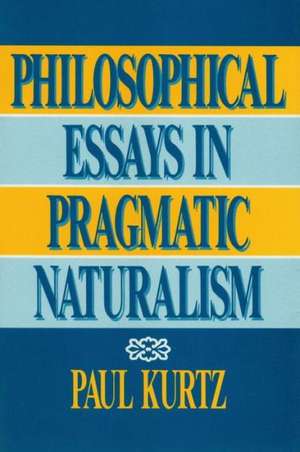Philosophical Essays in Pragmatic Naturalism
Autor Paul Kurtzen Limba Engleză Hardback – feb 1990
Part One focuses on "empirical metaphysics," a theory of nature grounded in the natural sciences and a theory of human nature drawn from behavioral science.
Part Two defends a modified naturalistic ethic: ethical problems can be resolved by the thoughtful employment of empirical methods and value judgments that have been tested in the trenches of human conduct and proven themselves to have beneficial consequences. Rejecting subjectivitism and absolutism, Kurtz argues for a form of objective relativism in which values are shaped and winnowed in the context of everyday experiences.
Part Three contrasts pragmatic naturalism with two of its keenest critics, phenomenology and existentialistm, both of which enjoyed considerable popularity in mid-century.
Philosophical Essays in Pragmatic Naturalism demonstrates Kurtz's unwaivering commitment to free inquiry, his appreciation of pluralism and diversity, and his fervent belief that the scientific method and critical intelligence that gave birth to pragmatic naturalism provide the foundations for a cosmic outlook and an authentic ethical humanism.
Preț: 216.35 lei
Nou
Puncte Express: 325
Preț estimativ în valută:
41.40€ • 42.77$ • 34.46£
41.40€ • 42.77$ • 34.46£
Carte disponibilă
Livrare economică 05-19 martie
Preluare comenzi: 021 569.72.76
Specificații
ISBN-13: 9780879755928
ISBN-10: 087975592X
Pagini: 265
Dimensiuni: 160 x 236 x 27 mm
Greutate: 0.57 kg
Ediția:New.
Editura: Globe Pequot Publishing Group Inc
ISBN-10: 087975592X
Pagini: 265
Dimensiuni: 160 x 236 x 27 mm
Greutate: 0.57 kg
Ediția:New.
Editura: Globe Pequot Publishing Group Inc
Notă biografică
Paul Kurtz (1925-2012), professor emeritus of philosophy at the State University of New York at Buffalo and a fellow of the American Association for the Advancement of Science, was the author or editor of more than fifty books, including The Transcendental Temptation, The Courage to Become, and Embracing the Power of Humanism, plus nine hundred articles and reviews. He was the founder and chairman of the Center for Inquiry, the Council for Secular Humanism, and the Committee for Skeptical Inquiry. He appeared on many major television and radio talk shows and lectured at universities worldwide.
